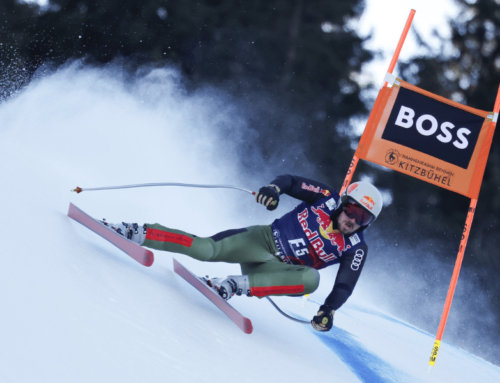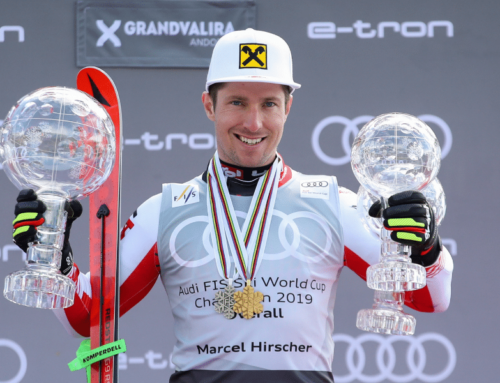‘Big Rig’ Reece Howden is Canada’s best shot at worlds gold
When Reece Howden claimed his third win in four World Cup ski cross races he took over the torch as the countries best ski cross racer, and the best shot at Canadian gold in Saturday’s world championships.
The races will be streamed live on CBCSports.ca on Saturday, beginning at 6:30 AM ET. View race schedule
The 22-year-old former alpine racer known as “Big Rig” has been dominant in the World Cup with a sizeable lead in the overall standings. Howden currently has 470 points, with Ryan Regaz and Johnas Lehnerr, both of Switzerland, with 341 and 298 points respectively.
Perhaps the best news for Howden is the venue for the worlds ski cross: Idre Fjall, Sweden, the same race track where he won back-to-back races in late January.
You could say his confidence is sky high.
But what’s with the “Big Rig” nickname?
“I guess you’d say I’m a bit of a country boy and I like drivin’ [a] big truck so they just called me that,” he said to Ski Racing with a chuckle. “Usually I have a more muscly approach than a finesse approach when it comes to sports and I’m a pretty big guy and I’ve always had a bit of speed behind me.”
Raised in Cultus Lake, B.C., and with the Apex Ski Club a couple of hours away, Howden is now in his first fully-dedicated World Cup season after graduating from the Southern Alberta Institute of Technology (Calgary, Alb.) in the spring, allowing him to devote more time to the World Cup tour.
“I went into this season with a pretty high goal to get into the semi final every race [top 8],” Howden said. “I figured that would give me the best shot to get on the box.”

After capturing silver and gold medals in Val Thorens, France in December he followed up with two more wins in Sweden.
At well over six feet, Howden towers over most of his competitors and teammates but it’s his athleticism and tactics that have made the difference this season. In the Sweden World Cup races he opted to take a risky approach of drafting in the finals, hanging back and waiting for the right time to strike. The strategy worked.
“The plan was to not come out in front, the draft was too strong,” he said after the race. “I wanted to chill in the middle of the pack and give my legs a bit of a break and once I made that last turn I fired up those engines to get out in front. The confidence is there so I can make those decisions.”
Alpine roots and all-mountain skiing, keys to success
But a negative stigma towards ski cross with alpine coaches and fellow competitors made it more difficult to discover the path.
Fortunately for Howden, he had the support of a few open-minded coaches, in particular the long-time head coach of the Apex club Jorgen Anderson, that cleared the path to explore other mountain interests.
“Being from a smaller hill we were always out there freeskiing in between training,” he said. “We had a 10 centimetre rule – if there was 10 cms of new snow we would all be out there pow skiing everytime.”
Howden soon developed a personal belief that the path to success involved skiing the entire mountain in all its forms. Training and racing with an alpine program, the Apex Mountain Ski Club, since he was 8 years-old, Howden’s interest in ski cross started with his desire to tackle tough terrain from an early age.

Apex Ski Club. Reece middle row (R) 
Forerunning Lake Louise World Cup downhill 
Reece with Apex club racers in 2018 
U18 downhill training at Kimberley in 2016
“I really believe that if you want to be a great racer you have to be great skier, you can’t just train gates all your life,” he said. “For me growing up in the mountains to be comfortable with dropping cliffs and going fast is what transferred onto the downhill track pretty well.”
Howden also benefitted from countless runs down the classic Apex downhill race course, one of the best downhill tracks in Western Canada which previously has hosted NorAms, national junior championships and regional races.
Canadian ski racing legacy in the making
Ski cross is still a relatively new sport but Howden follows a long line of Canadian trailblazers and soon-to-be legends of the sport.
Multiple World Cup, Olympic and world championship winners and medallists – such as Ashleigh McIvor, Kelsey Serwa, Stanley Hayer – and current teammates Brady Leman, Chris Delbosco, Kevin Drury and Marielle Thompson, Howden has been surrounded by the strongest ski cross team on the planet.

“It’s priceless to be able to ski with them, I wouldn’t be at the place I am now if I didn’t have the opportunity to compete and train with these guys,” Howden said.
“It’s super cool to have the opportunity to ski for Canada and to keep the legacy going, especially after coming off a season where Kevin Drury absolutely lit it up,” he said. [Drury won seven medals last season, including four wins, accumulating the most World Cup points in history]. Having the opportunity to fill those shoes as he recovers from that crash in Val Thorens is a privilege.”
As a co-ed sport, the men’s and women’s ski cross teams train and race together, at the same venues and on the same days.
“To be able to cheer on the girls when they’re doing great and vice versa is really cool. We’re very fortunate to have so much depth on both sides.”
Howden believes the ski cross culture in Canada is what gives the team an advantage.
“Canada really loves ski cross, we get a lot of support and we have a great bunch of skiers that jumped into the sport early on and blazed a trail. That early success has brought in more interest and athletes.”
Howden ‘fell into the sport’
Howden’s interest in ski cross was elevated when BC Alpine U16 events would include a ski cross race at the conclusion of an alpine race series, allowing entry to the skiers curious to test the waters. When Howden was attending a series of races at Sun Peaks with the Apex club, the organizers had set up ski cross features alongside the alpine races, along with the national ski cross development team.
“I had the chance to try out a start session a little and it was pretty cool,” Howden said. “We got to see what those guys do up close. But in some ways I feel like I just kind of fell into the sport.”
Based on his natural skill and promise shown at these events, Howden was invited to represent Canada at the 2016 Youth Olympic Games in Norway. Howden surprised nearly everyone, including himself, when he claimed gold in that event in Lillehammer.
“That was the spark that drove it home,” he said.
Shortly after, Howden would start to train with the national ski cross team, joining a roster full of World Cup winners.
And the rest, as they say, is history (in the making).

WORLD CHAMPS: Canadian ski cross athletes:
Brady Leman (Calgary, AB/Calgary Alpine Racing Club)
Chris Del Bosco (Montreal, QC/Ski & Snowboard Club Vail)
Courtney Hoffos (Windermere, B.C./Windermere Valley Ski Club)
Hannah Schmidt (Ottawa, ON/Club de Ski Mont-Tremblant)
Kris Mahler (Canmore, AB/Craigleith Ski Club)
Marielle Thompson (Whistler, B.C./Whistler Mountain Ski Club)
Reece Howden (Cultus Lake, B.C./Apex Ski Club)
Tiana Gairns (Prince George, B.C./Prince George Ski Club)
Zoe Chore (Cranbrook, B.C./Kimberley Alpine Ski Team)





















